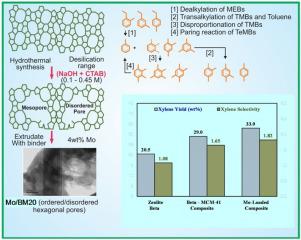Journal of Industrial and Engineering Chemistry ( IF 5.9 ) Pub Date : 2021-04-07 , DOI: 10.1016/j.jiec.2021.04.003 Syed A. Ali , Faisal M. Almulla , B. Rabindran Jermy , Abdullah M. Aitani , Raed H. Abudawoud , Mohammed Alamer , Ziyauddin S. Qureshi , Thamer Mohammad , Hassan S. Alasiri

|
Hierarchical composites of MCM-41 on zeolite Beta were synthesized by in-situ hydrothermal technique, characterized and their catalytic performance for converting heavy reformate into valuable xylenes was evaluated. Systematic optimization of the hierarchical pore generation was carried out by varying the strength of the alkaline solution (0.10−0.45 M NaOH) during disintegration of zeolite Beta. The nanocomposites obtained were extruded with alumina binder and impregnated with 4.0 wt% Mo. The characterization results indicate the transition of mesophase occurs from distinct disordered phase to ordered/disordered and then to ordered mesophase with increasing alkaline concentration. The xylene yield over the hierarchical composite zeolite was 1.4 times more than the parent zeolite Beta. Incorporation of a well-dispersed mild hydrogenation function (4 wt.% Mo) was advantageous in improving the xylene yield and selectivity. The formulation prepared with moderately alkaline (0.2 M NaOH) solution exhibited optimum bimodal pore structure and improved dealkylation and transalkylation conversion resulting in a xylene yield of 33.0 wt.% and 1.7 times enhancement in xylene selectivity over parent zeolite Beta. A 30 h stability test showed steady performance and xylene yields. Hence, a potential application of hierarchical zeolite Beta and MCM-41 composite catalysts for the conversion of heavy aromatics to produce xylenes has been successfully demonstrated.
中文翻译:

MCM-41在β型沸石上的分层复合催化剂,用于将重整重整产品转化为二甲苯
通过原位水热技术合成了MCM-41在β沸石上的分层复合材料,对其进行了表征,并评价了其对重整油转化为有价值的二甲苯的催化性能。通过改变 Beta沸石在分解过程中碱溶液的强度(0.10-0.45 M NaOH)来进行分层孔隙的系统优化。将获得的纳米复合材料用氧化铝粘合剂挤出并用4.0浸渍 表征结果表明,随着碱浓度的升高,中间相发生了从明显的无序相到有序/无序,然后到有序中间相的转变。分层复合沸石上的二甲苯收率是母体Beta Beta的1.4倍以上。引入分散良好的温和氢化功能(4 重量%的Mo)有利于提高二甲苯的产率和选择性。用中等碱性(0.2 M NaOH)溶液制备的制剂表现出最佳的双峰孔结构,并改善了脱烷基和烷基转移转化率,导致二甲苯收 率达33.0 wt。%,二甲苯选择性比母体沸石Beta高1.7倍。30岁 h稳定性测试表明性能稳定,二甲苯收率高。因此,已经成功地证明了分级沸石β和MCM-41复合催化剂在重质芳族化合物转化为生产二甲苯中的潜在应用。











































 京公网安备 11010802027423号
京公网安备 11010802027423号